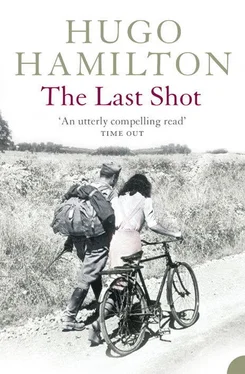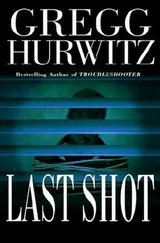1 ...6 7 8 10 11 12 ...39 ‘You cannot go there,’ she said. ‘Nothing for tourists.’ She waved her index finger.
I asked her what it was being used for. Who occupied it now?
‘Russen,’ she said.
It was not something she wanted to elaborate on. I had already asked too much. She walked away.
Since there was nothing else to do in Louny, I decided to walk back beyond the bus station up the hill to take a look at the garrison. It seemed like an impossible place to defend, surrounded only by a low wall and some rusted barbed wire. Around to the front of the garrison, along the wall, there was a large red star. That was as far as I went.
The journey back to Prague takes around an hour. The bus was full of workers commuting back to the towns along the way. A girl beside me kept falling asleep with her head repeatedly sinking on to my shoulder. Perhaps she was a factory, girl. She wore overalls underneath her coat. Every now and again she woke up and realized that she had begun to lean against me. But she soon fell asleep again. Whenever the bus stopped, she sat up, startled, looking out through the windows as though she had gone too far.
According to the diaries of Bertha Sommer, an impeccably written account of the life of a young woman who reached the age of twenty when the Second World War started, she was born with a trinity of strong values: faith, honesty and cleanliness. There was nothing Bertha liked more than to wash her feet in the evening. She liked clean feet. Her faith and honesty helped her through what she called ‘the turbulent times’ in which she lived.
Born in the small Rhineland town of Kempen, she was brought up in a family devoted to the Catholic faith, except perhaps for her father, Erich, who was more devoted to cynicism and a good joke. In any case, both cynicism and Catholicism combined to place the family at odds with the new ideology of Nazism, and with the people in their town who had risen to prominence out of nowhere.
Up to then, Bertha’s father had been a prominent businessman with a fine toy and stationery shop on the market square. He had a prodigious disregard for the most elementary notion of profit and loss. He refused to join what he called the ‘Brown Wave’. His standing with the people of the town was based on the old values of gentlemanly wit. ‘God save us from sudden wealth,’ he would say, to the amusement of his followers, who shared his taste for wine, song and humour, along with his compulsion for practical jokes. One Sunday morning he borrowed a brown Nazi cap and climbed up to place it on top of the St George monument at the centre of the market square. Then he went and apologized for offending St George.
But Germany had lost its sense of humour. Nothing could save Erich Sommer from the plummeting Weimar economy, the accelerating age of fascism and his own progressive ill-health. The pulmonary illness which he had brought back from the First World War got the better of him. He bowed out just before the Second World War, leaving behind his wife and five daughters, a trove of unsaleable toys, a hoard of initialled silver cutlery which was eventually sold off for nothing, and his inimitable sense of humour. Bertha writes how he asked her to bring him a mirror on his death-bed, where he looked at himself in silence for a long time before he said: ‘Auf Wiedersehen, Erich.’
With little else to share among them, the five sisters held on to some of their father’s humour. They had a propensity to break down laughing, often until the tears rolled down their faces. His remarks were repeated as a comfort to their mother.
Bertha’s mother, Maria, a professional opera singer who had given up her art for marriage, tried in vain to salvage the business. She resorted to giving singing and piano classes instead. If nothing else, the house was filled with laughter and music. Five girls and a mother who had once sung in the opera. They all sang arias, Schumann, hymns, love songs, pop songs like ‘Lili Marlene’, nursery rhymes – everything. In winter they placed a lighted candle into the grate to give students the illusion of warmth. But the demand for piano lessons had begun to diminish in a country preparing for war. The family eventually came to depend on social security under the new National Socialist state.
Life in Kempen became harder to explain. The Jews in the town disappeared. Families to whom Bertha had often been sent to buy gherkins had gone overnight. Once, on a trip to an aunt in Düsseldorf, Bertha records in her diary how she and her mother saw brand new shoes and leatherwear flung into the streets and how her mother said, ‘What idiots. They’ll regret this some day.’ Shortly after that, the social security payments were mysteriously withdrawn from the Sommer family and life became impossible.
Plans had to be made to ease the burden. Grandmothers and aunts all conferred to make the best decisions for the five girls. Husbands were sought for the two eldest. The two youngest continued at school. Bertha, right in the middle, went to work as a secretarial assistant at the employment exchange, where she went on to obtain excellent references praising her enthusiasm and attractive manner. When the war came, her attributes were welcomed into the service of the army as part of the civilian personnel.
Bertha spent most of the time on the French coast of Normandy until the British arrived. She used the years in France to help her family, regularly sending home money to her mother and regularly arriving home with suitcases full of French fashions – dresses, blouses, hats, lingerie – all of which were quickly claimed by her sisters.
Shortly before D Day, she left France for the last time, with her cases stuffed to the gills. The trains were packed with girls coming home with their belongings, all evacuating back from the Normandy coast. The bombs were already raining on Germany. Bertha prayed hard. When they heard the planes overhead, she prayed for her life. And for her suitcases.
The first sight of bombed-out buildings and torn railway tracks came as a shock. It made the satin dress she was wearing at the time feel so inappropriate. She prayed it would be her last train journey of this war.
In the middle of the night, the train stopped very suddenly with a terrible jolt. Most of the girls were asleep, heads against shoulders, legs stretched out with travel-weary familiarity. Right in the middle of the country, the train stopped so suddenly that the girls were flung to the floor, into each other’s arms or across each other. The lights went out. They could hear the sound of planes. Explosions of noise. Gunfire. In the distance, they saw the trail of anti-aircraft guns illuminating the sky. Nobody dared look out. Bertha found herself on the floor, underneath two others.
When the noise began to abate, an officer came through the carriage shouting at everyone to get out. The girls were all asking whether they should bring their cases. No luggage, the officer commanded.
They stepped down from the train and were all rushed into the forest which ran along the tracks. They could smell the smoke. Further along the line, the sky was lit up by a burning train, a munitions train which had come under fire. The girls held to the edge of the forest for fear of partisans. The night was black. Three hundred women, two officers, a dozen recruits. The French train driver was bribed, or persuaded at gunpoint, to drive the empty train past the bombed-out munitions train. All the time, they heard the planes overhead. And they smelled smoke.
When they rejoined the train further along the track it was missing half its carriages. Bertha was fortunate to be reunited with her luggage. Many of the other girls never saw their things again. One of the officers assured them that the luggage would be sent on after them, but nobody believed him. As soon as they were gone, the carriages left behind would be looted and burned out by the French resistance. When the shortened train resumed the journey in the direction of Germany, it carried dozens of sobbing girls.
Читать дальше
Конец ознакомительного отрывка
Купить книгу












